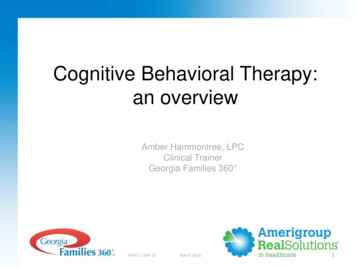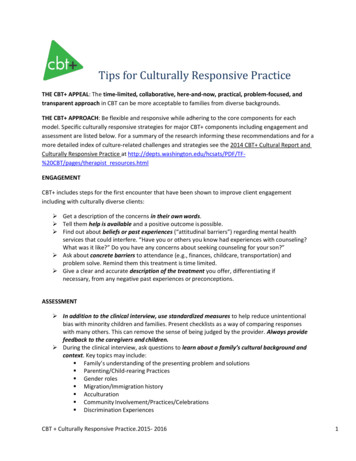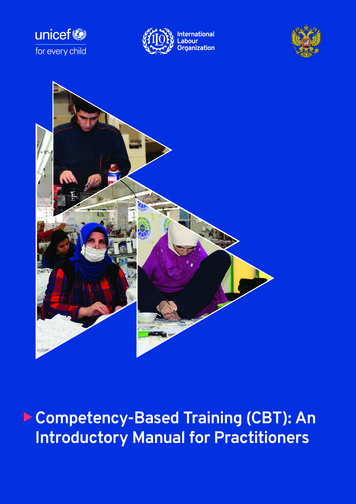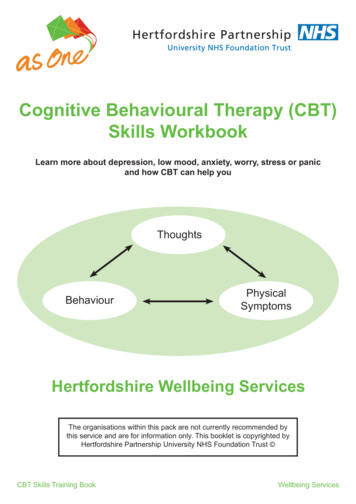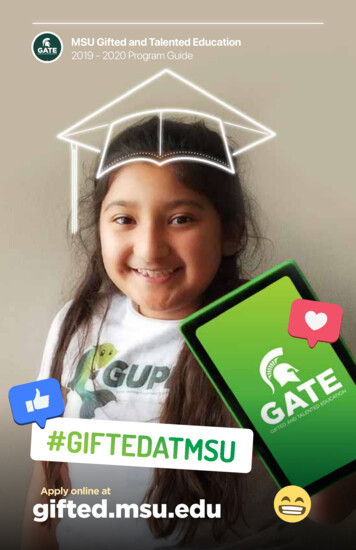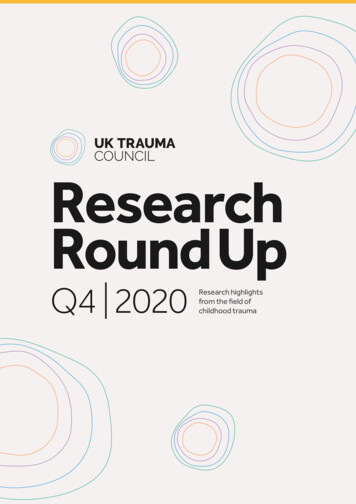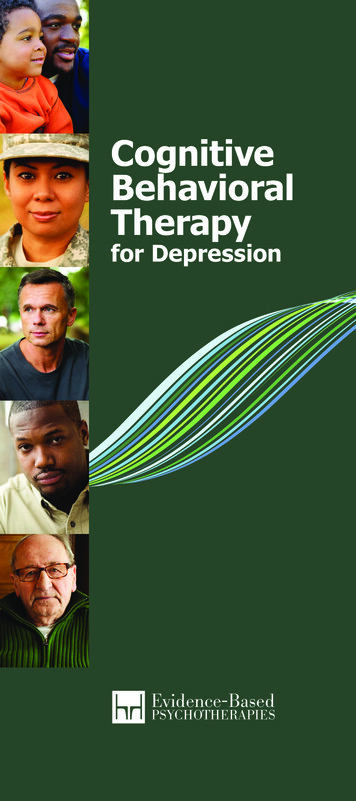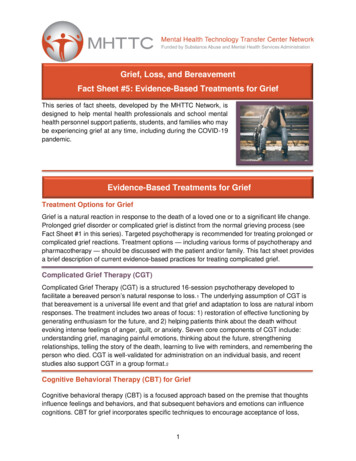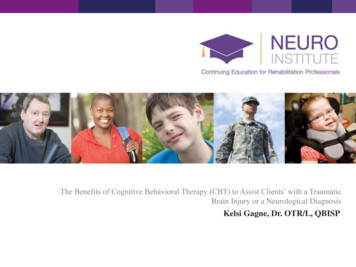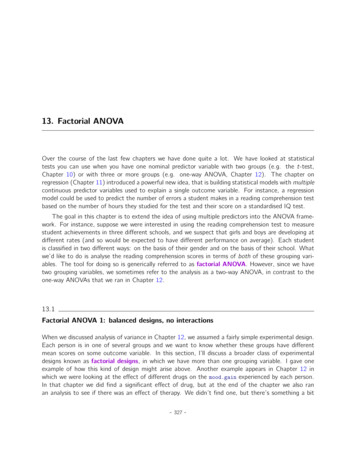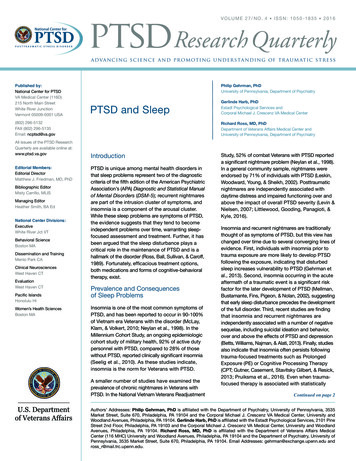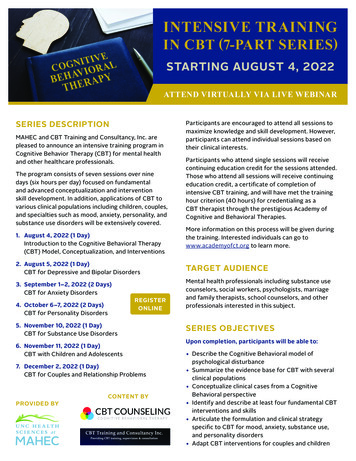
Transcription
INTENSIVE TRAININGIN CBT (7-PART SERIES)STARTING AUGUST 4, 2022ATTEND VIRTUALLY VIA LIVE WEBINARSERIES DESCRIPTIONMAHEC and CBT Training and Consultancy, Inc. arepleased to announce an intensive training program inCognitive Behavior Therapy (CBT) for mental healthand other healthcare professionals.The program consists of seven sessions over ninedays (six hours per day) focused on fundamentaland advanced conceptualization and interventionskill development. In addition, applications of CBT tovarious clinical populations including children, couples,and specialties such as mood, anxiety, personality, andsubstance use disorders will be extensively covered.1. August 4, 2022 (1 Day)Introduction to the Cognitive Behavioral Therapy(CBT) Model, Conceptualization, and Interventions2. August 5, 2022 (1 Day)CBT for Depressive and Bipolar Disorders3. September 1–2, 2022 (2 Days)CBT for Anxiety Disorders4. October 6–7, 2022 (2 Days)CBT for Personality DisordersREGISTERONLINE5. November 10, 2022 (1 Day)CBT for Substance Use Disorders6. November 11, 2022 (1 Day)CBT with Children and Adolescents7. December 2, 2022 (1 Day)CBT for Couples and Relationship ProblemsPROVIDED BYCONTENT BYParticipants are encouraged to attend all sessions tomaximize knowledge and skill development. However,participants can attend individual sessions based ontheir clinical interests.Participants who attend single sessions will receivecontinuing education credit for the sessions attended.Those who attend all sessions will receive continuingeducation credit, a certificate of completion ofintensive CBT training, and will have met the traininghour criterion (40 hours) for credentialing as aCBT therapist through the prestigious Academy ofCognitive and Behavioral Therapies.More information on this process will be given duringthe training. Interested individuals can go towww.academyofct.org to learn more.TARGET AUDIENCEMental health professionals including substance usecounselors, social workers, psychologists, marriageand family therapists, school counselors, and otherprofessionals interested in this subject.SERIES OBJECTIVESUpon completion, participants will be able to: Describe the Cognitive Behavioral model ofpsychological disturbance Summarize the evidence base for CBT with severalclinical populations Conceptualize clinical cases from a CognitiveBehavioral perspective Identify and describe at least four fundamental CBTinterventions and skills Articulate the formulation and clinical strategyspecific to CBT for mood, anxiety, substance use,and personality disorders Adapt CBT interventions for couples and children
INTENSIVE TRAINING IN CBT #1INTENSIVE TRAINING IN CBT #2DATELOCATIONCHECK-INPROGRAMThursday, August 4, 2022Live Webinar (Webex platform)8:30 am–9:00 am9:00 am–4:30 pmDATELOCATIONCHECK-INPROGRAMFriday, August 5, 2022Live Webinar (Webex platform)8:30 am–9:00 am9:00 am–4:30 pmTOPICIntroduction to the CognitiveBehavioral Therapy (CBT)Model, Conceptualization,and InterventionsTOPICCBT for Depressiveand Bipolar DisordersAGENDAAGENDA8:30 amCheck-in9:00 am Overview of Psychological Treatmentsfor Depressive & Bipolar Disordersand Their Effectiveness Beck’s Model of Depression: NegativeAutomatic Thoughts/Distortions/Dysfunctional Beliefs in Depression Overview of CBT with Depressed Clients8:30 amCheck-in9:00 am The Cognitive Behavioral Modeland Theory of Psychopathology Beck’s Model: Automatic Thoughts,Intermediate Beliefs, and Schemas Cognitive Distortions10:30 amBreak10:30 amBreak10:45 amContent Specificity, Myths about CBT,and Discussion of Other Models10:45 amBehavioral and Cognitive Interventions12:00 pmLunch Break1:00 pmMindfulness-based Cognitive Therapy(MBCT) and Relapse Prevention3:00 pmBreak3:15 pmCBT Interventions for Bipolar Disorderand Assessment & Interventions withSuicidal Clients4:30 pmAdjourn12:00 pmLunch Break1:00 pmCognitive Behavioral Conceptualizationand Competencies/General Skills3:00 pmBreak3:15 pmKey Cognitive and Behavioral Interventions4:30 pmAdjournOBJECTIVESUpon completion, participants will be able to: Describe the Cognitive Behavioral Model ofpsychological disturbance Conceptualize cases from a Cognitive Behavioralperspective Identify the key skills and techniques of CBTCREDITS NAADAC: 6.0NBCC: 6.0Psychologists: 6.0CEUs: 0.6Contact Hours: 6.0OBJECTIVESUpon completion, participants will be able to: Articulate the cognitive behavioral model ofdepression Identify and describe at least three clinicalprocedures with depressed and bipolar clients Summarize an assessment and intervention strategywith suicidal clientsCREDITS NAADAC: 6.0NBCC: 6.0Psychologists: 6.0CEUs: 0.6Contact Hours: 6.0
INTENSIVE TRAINING IN CBT #3DATE 1LOCATIONCHECK-INPROGRAMThursday, September 1, 2022Live Webinar (Webex platform)8:30 am–9:00 am9:00 am–4:30 pmDATE 2LOCATIONCHECK-INPROGRAMFriday, September 2, 2022Live Webinar (Webex platform)8:30 am–9:00 am9:00 am–4:30 pmTOPICCBT for Anxiety DisordersCREDITS NAADAC: 12.0NBCC: 12.0Psychologists: 12.0CEUs: 1.2Contact Hours: 12.0DAY 1 AGENDADAY 2 AGENDA8:30 amCheck-in8:30 amCheck-in9:00 am CBT Model of Anxiety Cognitive Content and Processingin Anxiety Disorders9:00 amCBT Model for the Maintenance of OCD:Principles of Exposure and ResponsePrevention (ERP) & Practice10:30 amBreak10:30 amBreak10:45 amModels of Worry and GeneralizeAnxiety Disorder (GAD):Assessment and Interventions10:45 amCognitive-based Alternatives to ERP:Thought-Action Fusion and Intoleranceof Uncertainty12:00 pmLunch Break12:00 pmLunch Break1:00 pmCBT Model of Panic Disorders:Assessment and Interventions1:00 pmCBT Model of PTSD & CognitiveProcessing Therapy3:00 pmBreak3:00 pmBreak3:15 pmCBT Model of Social Anxiety Disorder:Assessment and Interventions3:15 pm4:30 pmAdjournTrauma-focused CBT: ProlongedExposure and Special Issuesin the Treatment of PTSD4:30 pmAdjournDAY 1 OBJECTIVESUpon completion, participants will be able to: Articulate the Cognitive Behavioral Model of anxietydisorders Describe the role of intolerance of uncertainty (IOU)in maintaining GAD and a CBT intervention strategyfor IOU Summarize interoceptive and in-vivo exposureassessment and intervention procedures for PanicDisorder Describe a cognitive behavioral conceptualizationand intervention strategy for Social Anxiety DisorderDAY 2 OBJECTIVESUpon completion, participants will be able to: Summarize Cognitive Behavioral Models of OCD andPTSD Design exposure procedures for OCD and PTSD Describe cognitive interventions for OCD and PTSD Identify common issues encountered in providingCBT with OCD and PTSD clients and articulaterelevant strategies
INTENSIVE TRAINING IN CBT #4DATE 1LOCATIONCHECK-INPROGRAMThursday, October 6, 2022Live Webinar (Webex platform)8:30 am–9:00 am9:00 am–4:30 pmDATE 2LOCATIONCHECK-INPROGRAMFriday, October 7, 2022Live Webinar (Webex platform)8:30 am–9:00 am9:00 am–4:30 pmTOPICCBT for Personality DisordersCREDITS NAADAC: 12.0NBCC: 12.0Psychologists: 12.0CEUs: 1.2Contact Hours: 12.0DAY 1 AGENDADAY 2 AGENDA8:30 amCheck-in8:30 amCheck-in9:00 amKey Issues in Treating PDs:Beck’s Model of PDs and Young’sSchema Therapy Approach9:00 am10:30 amBreak Cognitive Behavioral Conceptualizationof Borderline Personality Disorder (BPD) Key Beliefs and Cognitive Processes:Interaction of Cognitive, Emotional,and Behavioral Factors10:45 amConceptualization and Interventionsfor Cluster C Personality Disorders:Techniques for Avoidant10:30 amBreak10:45 amCBT and DBT Intervention Strategies12:00 pmLunch Break12:00 pmLunch Break1:00 pmTechniques for Dependent and ObsessiveCompulsive Disorders1:00 pm3:00 pmBreakCBT Conceptualization of AntisocialPersonality Disorder (APD): CognitiveBiases and Behavioral Factors3:15 pmConceptualizing Histrionic &Narcissistic Personality Disordersand Determining Interventions3:00 pmBreak3:15 pmStrategies and Interventions for APD4:30 pmAdjourn4:30 pmAdjournDAY 1 OBJECTIVESUpon completion, participants will be able to: Describe the cognitive behavioral conceptualizationof personality disorders Detail an intervention strategy for Avoidant,Dependent, Obsessive Compulsive, Narcissistic, andHistrionic PDs Summarize at least three core CBT interventions forPDsDAY 2 OBJECTIVESUpon completion, participants will be able to: Conceptualize Borderline Personality Disorder (BPD)and Anti-Social Personality Disorder (APD) from acognitive behavioral perspective Summarize intervention strategies specific to BPDand APD Identify key skills missing from BPD and APDrepertoires
INTENSIVE TRAINING IN CBT #5INTENSIVE TRAINING IN CBT #6DATELOCATIONCHECK-INPROGRAMFriday, November 10, 2022Live Webinar (Webex platform)8:30 am–9:00 am9:00 am–4:30 pmDATELOCATIONCHECK-INPROGRAMFriday, November 11, 2022Live Webinar (Webex platform)8:30 am–9:00 am9:00 am–4:30 pmTOPICCBT for Substance Use DisordersTOPICCBT with Children and AdolescentsAGENDAAGENDA8:30 amCheck-in8:30 amCheck-in9:00 amOverview of Cognitive BehavioralApproaches: Motivational Interviewingand Behavioral Couple’s Therapy9:00 amOverview of Child CBT Evolution:Differences and Adaptations inChild and Adult CBT Models10:30 amBreak10:30 amBreak10:45 amBehavioral Self Control, ContingencyManagement, Behavioral Methods,and Cognitive Behavioral Model10:45 amCBT Assessment and Treatment Planningwith Children and Teens12:00 pmLunch Break1:00 pmOverview of CBT Interventions:Techniques for Depressed andAnxious Children and Teens12:00 pmLunch Break1:00 pmDeveloping a CBT Treatment Planand Interventions3:00 pmBreak3:00 pmBreak3:15 pmMindfulness-based Relapse Prevention3:15 pm4:30 pmAdjournCBT for Oppositional Defiant/ConductDisorders & Anger Issues and Evidencebased Treatments for ADHD4:30 pmAdjournOBJECTIVESUpon completion, participants will be able to: Implement the cognitive behavioral model ofsubstance use Describe at least three CBT interventions forsubstance use clients List evidence-based models for SUDs Discuss the interaction of mental illness and CBT inthe care of substance use clientsCREDITS NAADAC: 6.0NBCC: 6.0Psychologists: 6.0CEUs: 0.6Contact Hours: 6.0OBJECTIVESUpon completion, participants will be able to: Summarize the adaptations in style, process, andinterventions of standard CBT for children List at least three CBT interventions for children andadolescents with emotional problems Describe a CBT approach for child and adolescentproblem behaviorCREDITS NAADAC: 6.0NBCC: 6.0Psychologists: 6.0CEUs: 0.6Contact Hours: 6.0
INTENSIVE TRAINING IN CBT #7DATELOCATIONCHECK-INPROGRAMFriday, December 2, 2022Live Webinar (Webex platform)8:30 am–9:00 am9:00 am–4:30 pmTOPICCBT for Couples andRelationship ProblemsAGENDACREDIT OFFERINGSNAADAC: This course has been approvedby MAHEC, as a NAADAC ApprovedEducation Provider, for educationalcredits. NAADAC Provider #165445.MAHEC is responsible for all aspects of theirprogramming.NBCC: MAHEC has been approvedby NBCC as an Approved ContinuingEducation Provider, ACEP No. 5514.Programs that do not qualify for NBCCcredit are clearly identified. MAHEC issolely responsible for all aspects of their programs.8:30 amCheck-in9:00 amOverview of Cognitive BehavioralModel and Approaches to Coupleand Family Problems10:30 amBreak10:45 amSteps in Conducting Couple CBT:Assessment, Identification of Variables,and Treatment Planning12:00 pmLunch BreakCEUs: MAHEC designates this live continuing educationactivity as meeting the criteria for CEUs as establishedby the National Task Force on the ContinuingEducation Unit.1:00 pmCognitive and Behavioral Techniques:Strategies from CBT-related Fields(ACT, DBT, and Positive Psychology)Contact Hours: MAHEC designates this live continuingeducation activity as meeting the criteria for contacthours.3:00 pmBreak3:15 pmCBT Model of Family Problemsand Family Interventions4:30 pmAdjournOBJECTIVESUpon completion, participants will be able to: Summarize the Cognitive Behavioral Model ofrelationship disturbance Assess couple or family problems from a cognitivebehavioral perspective Identify and describe at least three CBT couple orfamily interventionsCREDITS NAADAC: 6.0NBCC: 6.0Psychologists: 6.0CEUs: 0.6Contact Hours: 6.0Psychologists: MAHEC is recognized by the NorthCarolina Psychology Board as an approved Provider ofCategory A Continuing Education for North CarolinaLicensed Psychologists.
SERIES FACULTYJohn Ludgate, PhD, is a licensedpsychologist who has worked as apsychotherapist for almost 30 years.He currently works at the CBT Centerof Western North Carolina, locatedin Asheville, NC. He specializes intreating mood, anxiety, relationship, and psychosexualdisorders. As well as having an active clinical practice,he is involved in training and supervision in CBT.He obtained a bachelor’s degree in Psychology fromTrinity College, Dublin; a master’s degree in ClinicalPsychology from University of Edinburgh in Scotland;and a PhD from Trinity College, Dublin. He trainedat the Center for Cognitive Therapy under Dr. AaronBeck, the founder of Cognitive Therapy, obtaininga Post-Doctoral Fellowship in Cognitive Therapyfrom the University of Pennsylvania in 1986. Hesubsequently became Assistant Director of Training atDr. Beck’s Center. In the early 1990s, Dr. Ludgate wasa Research Clinical Psychologist at the University ofOxford in England and served as a cognitive-behavioraltherapist in several outcome studies of panic disorder,agoraphobia, social phobia, and hypochondriasis. Hesubsequently worked as a clinical psychologist in stateagencies and private practice.In 1988, he published the book MaximizingPsychotherapeutic Gains and Preventing Relapse inEmotionally Distressed Clients and was co-editor withBeck and others of Cognitive Therapy with Inpatients:Developing a Cognitive Milieu, published in 1990. Hepublished Cognitive-Behavioral Therapy and RelapsePrevention for Depression and Anxiety in 2009 andHeal Yourself: A CBT Approach to Reducing TherapistDistress and Increasing Therapeutic Effectiveness in2012. In 2014, he co-authored the book OvercomingCompassion Fatigue: A Practical Resilience Workbookwith Martha Teater. In 2016, he co-edited the bookTeaching and Supervising Cognitive BehavioralTherapy, published by Wiley. With Teresa Grubr, hepublished the CBT Couples Toolbox in 2018. He haswritten numerous journal articles and book chaptersin the field of Cognitive Behavior Therapy for anxietyand depression. He has presented many seminars andworkshops on cognitive behavioral approaches, bothnationally and internationally.He is a Founding Fellow of the Academy of CognitiveTherapy and serves on the Credentialing Committee ofthe Academy.R. Trent Codd, III, Ed.S., is the ExecutiveDirector of the Cognitive-BehavioralTherapy Center of WNC. He specializesin evidence-based practice and hasextensive training and experience withseveral empirically supported therapies,including Beckian Cognitive Therapy and ClinicalBehavior Analytic approaches such as Goldiamond’sConstructional/Non-linear Functional AnalyticApproach, Acceptance and Commitment Therapy(ACT), Functional Analytic Psychotherapy (FAP), andRadically Open Dialectical Behavior Therapy (RO DBT).Trent treats a broad range of clinical concerns, buthas particular interest in the treatment of disordersof over-control and OC-Spectrum Disorders. Heworks with children, adolescents, and adults. Trentreceived his M.A. and Ed.S. degrees in Mental HealthCounseling at the University of Florida and completedan internship at UF’s Shands Health Hospital inpatientpsychiatric unit. He also completed a Certificate ofGraduate Study in Alcohol and Drug Studies at theUniversity of South Carolina’s School of Public Health,as well as graduate training in Applied BehaviorAnalysis at the University of North Texas. He trained atthe Beck Institute for Cognitive Therapy and Researchand is a graduate of the International ObsessiveCompulsive Disorder Foundation’s and the NationalTourette Syndrome Association’s Tourette SyndromeBehavior Therapy Training Institutes (BTTIs).Trent is a Fellow of the Academy of Cognitive Therapy,a Board Certified Behavior Analyst, and maintainsprofessional membership in the Association forBehavior Analysis International, the Associationfor Contextual and Behavioral Science, and theAssociation for Behavioral and Cognitive Therapies. Heis the co-author of Teaching and Supervising CognitiveBehavioral Therapy and Socratic Questioning forTherapists and Counselors: Learn How to Think andIntervene Like a Cognitive Behavior Therapist.
REGISTRATION POLICIESSession and series fees listed on the following pageinclude administrative costs and educational materials.MAHEC has a pay-up-front policy for all CE programs.The only exceptions will be for pre-approved programswhere an individual payment plan is appropriate.Registrations that are received without accompanyingpayment will not be processed and participants whohave not paid the course fee will not be admitted intothe program.Unless otherwise noted in course materials, thefollowing cancellation policy applies to all programs: Cancellations must be in writing(via fax, email, or mail) Cancellations received more than 2 weeks prior tothe event will receive 100% refund Cancellations received between two weeks and twofull business days prior to the first day of the eventare refunded at 70% of the registration fee subjectto a minimum 25 cancellation fee No refunds or credits will be given for cancellationsreceived less than two full business days prior tothe event No vouchers will be issued in lieu of a refund Transfers/substitute(s) are welcome (please notifyus in advance of the program)MAHEC assumes permission to use audio, video,and still images from this program for promotionaland educational purposes. Please speak with a staffmember if you have any concerns.HAVE A QUESTION?Special Services828-348-3630Program PlannerKatherine Van Horne, MAT828-257-4400 katherine.vanhorne@mahec.netRegistration ration Fax828-257-4768MailMAHEC Registration121 Hendersonville RoadAsheville, NC 28803Online education
INTENSIVE TRAININGIN CBT (7-PART SERIES)STARTING AUGUST 4, 2022ATTEND VIRTUALLY VIA LIVE WEBINARGENERAL REGISTRATION FEESAug. 4, 2022 (1 Day)Aug. 5, 2022 (1 Day) 150.00 150.00Sept. 1–2, 2022 (2 Days) 300.00 300.00Nov. 10, 2022 (1 Day)Nov. 11, 2022 (1 Day) 150.00REGISTRATION FORMEvent #68122Name 150.00 1,000.00DISCOUNTED REGISTRATION FEESAug. 4, 2022 (1 Day)Aug. 5, 2022 (1 Day) 120.00 120.00Sept. 1–2, 2022 (2 Days) 240.00CredentialsPIN #ENTIRE SERIESGroups (five or more from the same agency, registeringand paying at the same time) and MAHEC Employees.REGISTER ONLINEUpdated contact information 150.00Dec. 2, 2022 (1 Day)By registering for this series or sessions therein, youare granting permission for your contact informationto be shared with CBT training and Consultancy, Inc.and CBT Counseling Centers.Oct. 6–7, 2022 (2 Days)(4 digits of your choosing that youwill use each time you register)Nov. 10, 2022 (1 Day) 120.00 240.00Nov. 11, 2022 (1 Day) 120.00Dec. 2, 2022 (1 Day)OccupationOct. 6–7, 2022 (2 Days) 120.00ENTIRE SERIES 900.00Email AddressProgram announcements will be sent to your emailunless you opt out from receiving MAHEC emails.We never share our mailing lists.Please remove me from the MAHEC mailing listHome AddressCityCheck is enclosedStateZIPVerification CodeDiscover CardAmEx/(3 or 4-digit number)Name on CardDepartmentSignatureEmployer’s AddressWork CountyMasterCardExpiration Month/YearWork #EmployerCityVisaCredit card information belowAccount #Home CountyHome #Full payment must accompany all submittedregistrations unless a payment plan has beenapproved in advance. Registrations received withoutaccompanying payment will not be processed.StateZIPSend completed registration to: MAHEC Registration121 Hendersonville Road, Asheville, NC 28803Fax completed registration to: 828-257-4768
Introduction to the Cognitive Behavioral Therapy (CBT) Model, Conceptualization, and Interventions 2. August 5, 2022 (1 Day) CBT for Depressive and Bipolar Disorders 3. September 1-2, 2022 (2 Days) CBT for Anxiety Disorders 4. October 6-7, 2022 (2 Days) CBT for Personality Disorders 5. November 10, 2022 (1 Day) CBT for Substance Use .
